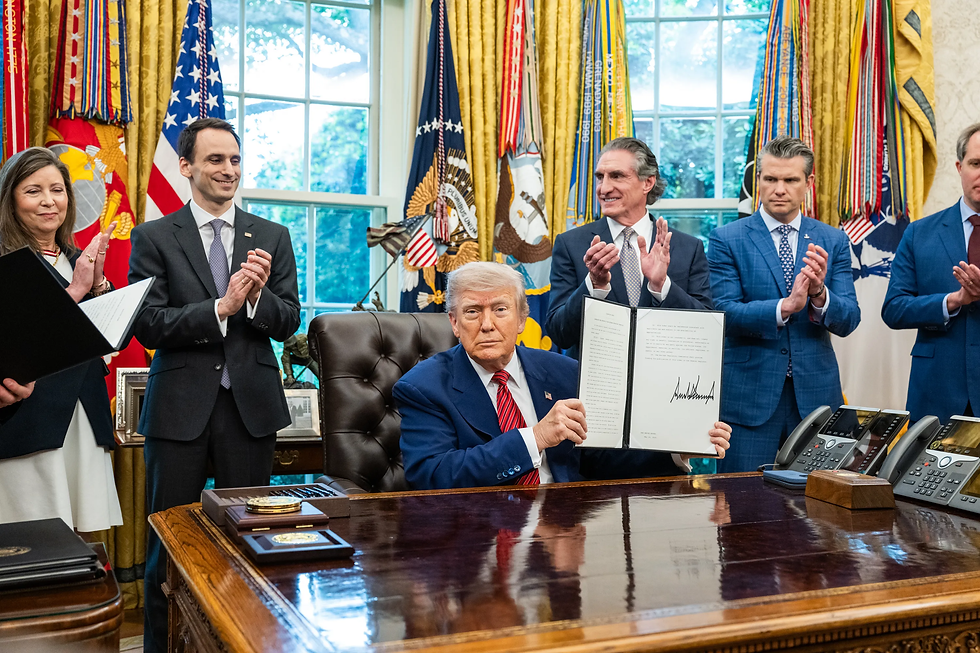Fast-Tracking Fission or Politicizing Safety? Trump’s NRC Shake-Up
- AnnaJulia Yates
- Aug 18, 2025
- 3 min read
With the enactment of five new executive orders, the Trump administration demonstrated a renewed American interest in the future of nuclear power - as well as an intent to accelerate the licensing process and development of the country’s commercial nuclear technology. Among the orders, which were signed in the Oval Office in the presence of nuclear startup CEOs and utilities leaders, was a bill reforming the American Nuclear Regulatory Commission with the intention of fast-tracking the reactor licensing process. The bill, titled “Ordering The Reform of the Nuclear Regulatory Commission” and signed on May 23rd, orders the NRC to reorganize, aided by the Department of Government Efficiency (DOGE). It instates a wholesale revision of NRC regulations within 18 months, and orders fixed, enforceable deadlines, to enable high-volume, standardized licensing for microreactors and modular reactors, as well as cutting staff. Endorsing the bill, attendees denounced “regulatory delay” as the historical problem in America’s nuclear journey.

Criticism of the American nuclear regulator precedes President Trump. Since its official creation in 1974, the organization has been accused of regulatory capture - that is, advancing the interests of the industry that it is charged to regulate, rather than operating in the public interest. “[The NRC] placed industry profits ahead of public safety.”, a Greenpeace nuclear policy analyst told the New York Times in 2008. Over the years, however, the tone of public criticism has changed. Since the 1979 Three Mile Island nuclear accident, regulation has tightened. The USA has seen a decline in nuclear reactors being licensed - and has accused the NRC of overregulation. This overregulation, it is argued, has led to licensing process delays and ultimately the fall of the American nuclear industry. The recent executive orders aim to “turn the clock back on over fifty years of overregulation of the industry”, said Doug Burgum, secretary of the interior.
While many - including nuclear startup CEOs like Oklo’s Jacob Dewitte (whose Aurora reactor design was rejected by the NRC back in 2020) - applaud the bill, others have concerns about the threatened independence of the regulator. Though attached to the US Government, the NRC is not a part of a cabinet department. Commissioners serve staggered 5 year terms, and no more than three can belong to the same political party. The organization is funded largely by fees collected from licensees. Legally, the president and congress cannot intervene in individual licensing cases, or order the NRC to issue, deny, or accelerate a license.
According to some, the new executive order threatens this independence. Following its enactment, Dr Allison Macfarlane, Dr Stephen Burns, and Dr Richard Meserve, all ex-chairmen of the Commission, published a piece warning that the order could compromise the NRC’s ability to make unbiased and technically grounded decisions by subjecting its regulatory judgments to greater political oversight. They outlined “a shared concern that the changes will have unintended, dangerous consequences”, intruding on the autonomy of the agency and “giving the White House the capacity to control NRC regulatory actions and allow politics to infect regulatory decision-making”.
Despite public concern, Trump pushed forward with his initiative by firing Christopher Hanson, an NRC commissioner, with no stated justification. More recently, he expelled all but one member of the nuclear waste oversight board. All of these pursuits will certainly lead to drastic changes in the future of the American nuclear industry: the question is whether they will be for the better or for the worse.
.png)


Comments